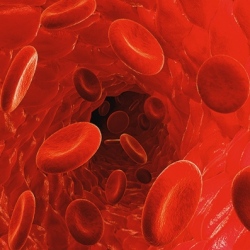
Genetically engineering red blood cells to turn them into drug-delivery vehicles could open the door to a vast number of new therapies. And since mature red cells don’t carry any genetic material, they would also carry fewer safety risks than other gene and cell therapies. That’s the idea behind a startup called Rubius.
Rubius’s first drug will be for phenylketonuria, or PKU, a devastating genetic disorder that renders people with the disease unable to digest the amino acid phenylalanine, which is found in most high-protein foods. Left untreated, PKU can lead to a variety of serious health problems including brain damage, but the only way to treat it is with an extremely restrictive diet.
The company has so far tested the PKU drug in animals and in human blood in the lab, and it aims to begin clinical testing next year. In addition to the PKU therapy, Rubius has developed over 50 different therapies based on red blood cells, says Avak Kahvejian, the company’s CEO and a partner at Flagship. He says the approach could lead to biologic therapies for a range of problems including hematologic disorders, autoimmune disorders, infectious diseases, and cancer.
The new technology draws on recent advances in the ability to genetically modify and grow human red blood cells from stem cells in culture. Using established molecular biology techniques, Rubius’s scientists can engineer progenitor cells taken from human bone marrow and grow blood cells that produce specific therapeutic proteins on their surface or inside the cell. Before they become fully mature, mammalian red blood cells eject their genetic material, so as a therapy they are easier to control and less risky than other stem cell and gene therapies, which can lead to abnormal cell growth and tumors.
Human red blood cells circulate for as long as four months, meaning they could potentially form the basis of long-term therapies. The cells can get anywhere in the body through the bloodstream and can protect the therapeutic agent from the immune system, says Kahvejian.
In the case of PKU, researchers have identified enzymes that can break down phenylalanine, “but you can’t just inject an enzyme into the bloodstream,” because the body will clear it quickly, and it could induce an immune reaction that would render future treatments with the same enzyme useless, says Harvey Lodish, a professor of biology and bioengineering at MIT and a member of the Whitehead Institute for Biomedical Research. Lodish, a scientific cofounder and member of Rubius’s board of directors, says engineering red blood cells to produce the desired enzyme “answers both problems.”
Lodish says animal tests suggest that engineered red blood cells can be a “very potent” therapy for a range of diseases. He says not-yet-published work from his lab has shown that cells modified to produce an antibody to a specific bacterial toxin render mice resistant to many times the lethal dose of that toxin.
It takes only a few weeks to grow cells that produce a new protein of interest, a process Kahvejian calls “rapid prototyping.” The company is remaining tight-lipped about what additional therapies might be in the pipeline, but Kahvejian says the potential for new drugs based on red blood cells is “only limited by your imagination.”
